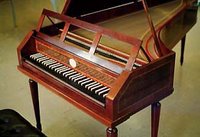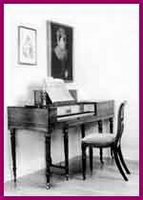 How I’d love to see that sentence in a regency. Since music was such a major part of Jane Austen’s life–and that of her heroines–I thought I’d blog about that today, as we recover from the rigors and excitement of our contest (congratulations, winners!). Some soothing piano music might help, too.
How I’d love to see that sentence in a regency. Since music was such a major part of Jane Austen’s life–and that of her heroines–I thought I’d blog about that today, as we recover from the rigors and excitement of our contest (congratulations, winners!). Some soothing piano music might help, too.
 Jane Austen’s music books–copied by hand–are at her house in Chawton, Hants, as is her piano (left), made in 1810 by the composer Clementi, who owned one of the major piano manufacturers in London. One of Clementi’s rivals was the firm of John Broadwood & Sons, still in business, and serving as providers of pianos to royalty ever since George II’s time. The gorgeous instrument above was made by Zumpt & Buntebant of London and taken by Johann Christian Bach (son of the great J.S.) when he and the young Mozart visited France in 1778.
Jane Austen’s music books–copied by hand–are at her house in Chawton, Hants, as is her piano (left), made in 1810 by the composer Clementi, who owned one of the major piano manufacturers in London. One of Clementi’s rivals was the firm of John Broadwood & Sons, still in business, and serving as providers of pianos to royalty ever since George II’s time. The gorgeous instrument above was made by Zumpt & Buntebant of London and taken by Johann Christian Bach (son of the great J.S.) when he and the young Mozart visited France in 1778.
Jane’s favorites included Clementi, Haydn and lesser-known composers Pleyel, Eichner and Piccini. Here’s a recollection from her niece Caroline:
Aunt Jane began her day with music – for which I conclude she had a natural taste; as she thus kept it up – ‘tho she had no one to teach; was never induced (as I have heard) to play in company; and none of her family cared much for it. I suppose that she might not trouble them, she chose her practising time before breakfast – when she could have the room to herself – She practised regularly every morning – She played very pretty tunes, I thought – and I liked to stand by her and listen to them; but the music (for I knew the books well in after years) would now be thought disgracefully easy – Much that she played from was manuscript, copied out by herself – and so neatly and correctly, that it was as easy to read as print.
Jane’s piano is a square fortepiano–the term used for early pianos. The great technological breakthrough of the piano (or whatever you want to call it!) is that unlike its predecessor the harpsichord it offered dynamic control–hence it’s name, Italian for loud-soft, and used a hammer action, not a plucking action, on the strings. Fortepianos were first produced in the mid-eighteenth century and were built entirely of wood (modern pianos are held together with a large steel band to hold in the formidable tension of the strings), and have a more delicate, subtle sound than modern pianos. To hear the instrument go to this recording of Mozart and Schubert on amazon, where you can listen to excerpts. The artist is Melvyn Tan, who performed the fortepiano music heard on the movie Persuasion.


Here are a couple more recordings available from the Jane Austen Museum in Bath. A Very Innocent Diversion features selections from Jane Austen’s music collection while the other features music from Jane Austen’s time performed in Bath.
Would music–daily piano practice– feature in your Regency fantasy or nightmare? Or, like Mrs. Elton, would you gratefully become a talker (although not totally devoid of taste, of course) and not a practitioner once you succumbed to the rigors of married life? And as (Cara, I think?) said, it might be interesting to see how truly accomplished those young ladies were…hopefully none of us would be like Mary Bennett, plucked from the keyboard by her embarrassed papa. And do you think that if you were magically transported back to Regency times, you might miss being able to summon music at the push of a button, or do you think the comparative rarity of a live performance (a good one, that is) might heighten your appreciation?
Janet

Practicing piano would definitely figure in my Regency fantasy, not my Regency nightmare. 🙂 I play the piano myself, much as it seems Jane Austen did, for my own pleasure, and for no other reason. I’m sure I would do the same in my Regency fantasy! Or, even better — without the distraction of Lara Croft and computer solitaire and their ilk, surely I would practice more, and play well enough to entertain others.
To defend Mary Bennet, I will point out that she was technically a better player than Elizabeth! 🙂
I would miss much music, though. I love being overwhelmed by music I love, played loudly (on a stereo, in a movie theater, or live) — whether it’s Beethoven, a Broadway musical, or rock/pop. That’s an experience I would mostly have to forgo in my Regency life…
Cara (who’s listening to Tears for Fears as she writes this)
Wow! This is what I like best about this blog – I have been educating myself about the Regency period solely through this blog, and what a fun way it is too!!:-) And, I especially love checking out the costume and jewellery links (and yes, the original posts too Elena)…
If I am not incorrect, this is the first time a music-related message has been posted…and it’s really interesting. Yes Cara, ‘practising a grand piano’ would be part of my regency fantasy too… 🙂
(too many ‘too’s in this comment I guess)
Actually, I think Amanda did a Beethoven post sometime in December… Amanda?
Cara
(who knows a lot more about Regency gambling and theatre than she does Regency music!)
Oops! You’re absolutely right, Cara.
One thing that I’ve often thought is that in an age before recorded music, there would be a very strong incentive to learn to play. In the modern age, one can always contrast one’s performance to recordings of virtuosos, and naturally come off the loser. If one wants to listen to music, one can just turn on the radio or pop a CD into the player (or, these days, play an MP3 in an iPod or computer). There is little need to learn to play.
On the other hand, before recording, if you wanted to listen to music, you either had to play it or convince someone else to do so. Unless a family wanted to be totally bereft of music (except by going out to concerts or more accomplished friends’ houses), someone would have to know how to play. When you think about it like that, it is only natural that playing and singing would be considered part of every young lady’s–and many young man’s–required accomplishments.
Another difference with recording is that we focus much more on particular performances. On the radio, we don’t hear random people sing “A Hard Day’s Night,” we hear the Beatles sing it. In the Regency, you were likely to hear a famous performer only rarely. The focus would be much more on particular musical pieces than particular performers. And indeed, before the advent of recording, there was already a thriving popular music industry–in the business of selling sheet music.
I’m happy that I can turn on a huge variety of accomplished professional musicians whenever I like. But I do think we’ve lost something, now that the ability to play is an uncommon indulgence rather than a universal necessity.
Todd-who-is-quite-accomplished-on-the-kazoo
I did do a Beethoven post, to celebrate his birthday back in December! (I work at a classical music radio station, and every day we have a “classical birthday hour”, so there is always lots of info on stuff like that around!). I so much admire anyone with musical talent, and always wished I had some myself, but I was a miserable failure at piano lessons, and even my cats don’t like it when I sing along with my CDs! 🙂
One of my favorite “unusual” museums in England is Finchcocks, which has been transformed by the owners (one of which is a concert pianist) into a showplace of period musical instruments. The earliest is (I think) 17th century. They have demonstrations and concerts, and it’s a lovely old Georgian house besides.
Playing the pianoforte would be part of my Regency fantasy, too. I used to play quite a bit, and think it would be wonderful if it were actually a duty rather than something I can’t seem to find time for, between writing, school volunteering, and annoying things like housework…
I agree with Todd, I think the easy access to so much wonderful recorded music means fewer people are inclined to play at home. Part of it is there’s less need, but also people may be intimidated when they compare their amateur efforts to recordings by world-class musicians. I think that’s a shame, because I think there’s a need for art at all levels. There’s also something special about live performance, again at any level.
Luckily, there are still many people with the natural desire to create music (and other forms of art).
Elena, whose youngest has her first piano lesson next week 🙂